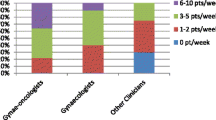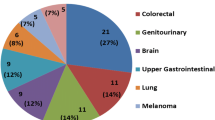Abstract
Healthcare professionals (HCP) play an important role in the practical application of genetic screening tests but often feel inadequately prepared for cancer genetic testing (CGT) in clinical care. As the complexity of gene-related malignancies increases, it demands HCPs’ preparedness to cater to patients’ needs. Therefore, the aim of our study is to assess the knowledge, attitude, and practices of HCPs in Pakistan regarding the application of cancer genetics. Our cross-sectional survey was conducted from April 2022 to June 2022 amongst HCPs at a private and a governmental institution in Karachi, Pakistan. Non-probability random convenience sampling was used to select the population; however. non-clinical HCPs, as well as Interns, were excluded from our study. A total of 210 HCPs, 56.7% (119) bearing an experience of over 5 years of clinical experience, were included in this study. Most respondents from both hospitals deemed their knowledge inadequate, with only 2% (2) and 1.8% (2) being extremely knowledgeable, respectively. 68.6% (144) HCPs displayed a positive attitude towards CGT, with 55.2% (116) participants perceiving CGT in a positive light. As compared to the private sector, significantly more HCPs in the public sector dedicated ≥ 5 h/week for CME (P = 0.006), and were better prepared to counsel patients (P = 0.021) and interpret results concerning CGT (P = 0.020). Additionally, screening tests for specific cancer types were popularly considered a worthwhile avenue of investment to improve the current state of CGT in our healthcare system [47.6% (N = 100)]. Demonstrating a lack of knowledge among Pakistani doctors, our results call upon the need for additional training concerning CGT in both the public and private sectors alike. Understanding specific gaps in knowledge may further help enhance post-graduate training programs and eventually lead to effective incorporation of CGT into our healthcare setting.
Similar content being viewed by others
Data availability
The datasets used and/or analyzed during the current study are available from the corresponding author on reasonable request.
References
Acton RT, Burst NM, Casebeer L, Ferguson SM, Greene P, Laird BL, et al. (2000) Knowledge, attitudes, and behaviors of Alabama’s primary care physicians regarding cancer genetics. Academic Medicine. 75(8)
Ashfaq M, Amanullah F, Ashfaq A, Ormond KE (2013) The views of Pakistani doctors regarding genetic counseling services – is there a future? J Genet Couns 22(6):721–732
Baars MJH, Henneman L, ten Kate LP (2005) Deficiency of knowledge of genetics and genetic tests among general practitioners, gynecologists, and pediatricians: a global problem. Genet Med 7(9):605–610
Becker F, van El CG, Ibarreta D, Zika E, Hogarth S, Borry P, et al. (2011) Genetic testing and common disorders in a public health framework: how to assess relevance and possibilities. Background Document to the ESHG recommendations on genetic testing and common disorders. Eur J Hum Genet. 19 Suppl:S6–44.
Cancer Fact Sheet: World Health Organization. Available from: https://www.who.int/news-room/fact-sheets/detail/cancer.
Cancer: World Health Organization; [July 3 2022]. Available from: https://www.who.int/health-topics/cancer#tab=tab_1.
Feero WG, Green ED (2011) Genomics education for health care professionals in the 21st century. JAMA 306(9):989–990
Hann KEJ, Fraser L, Side L, Gessler S, Waller J, Sanderson SC et al (2017) Health care professionals’ attitudes towards population-based genetic testing and risk-stratification for ovarian cancer: a cross-sectional survey. BMC Womens Health 17(1):132
Heena H, Durrani S, Riaz M, AlFayyad I, Tabasim R, Parvez G et al (2019) Knowledge, attitudes, and practices related to breast cancer screening among female health care professionals: a cross sectional study. BMC Womens Health 19(1):122
Klitzman R, Chung W, Marder K, Shanmugham A, Chin LJ, Stark M et al (2013) Attitudes and practices among internists concerning genetic testing. J Genet Couns 22(1):90–100
Kurji Z, Premani ZS, Mithani Y (2016) Analysis of the health care system of Pakistan: lessons learnt and way forward. J Ayub Med College Abbottabad : JAMC 28(3):601–604
Lindor NM, Greene MH, Mayo Familial Cancer P (1998) The concise handbook of family cancer syndromes. JNCI: J Nat Cancer Inst 90(14):1039–71
Marzuillo C, De Vito C, Boccia S, D’Addario M, D’Andrea E, Santini P et al (2013) Knowledge, attitudes and behavior of physicians regarding predictive genetic tests for breast and colorectal cancer. Prev Med 57(5):477–482
Nippert I, Harris HJ, Julian-Reynier C, Kristoffersson U, ten Kate LP, Anionwu E et al (2011) Confidence of primary care physicians in their ability to carry out basic medical genetic tasks—a European survey in five countries—Part 1. J Community Genet 2(1):1–11
Offit K, Brown K (1994) Quantitating familial cancer risk: a resource for clinical oncologists. J Clin Oncol 12(8):1724–1736
Pakistan Fact Sheet: World Health Organization; Source: Globocan 2020. Available from: https://gco.iarc.fr/today/data/factsheets/populations/586-pakistan-fact-sheets.pdf.
Panic N, Leoncini E, Di Giannantonio P, Simone B, Silenzi A, Ferriero AM et al (2014) Survey on knowledge, attitudes, and training needs of Italian residents on genetic tests for hereditary breast and colorectal cancer. Biomed Res Int 2014:418416
PDQ® Cancer Genetics Editorial Board. PDQ cancer genetics overview: Bethesda, MD: National Cancer Institute. Available from: https://www.cancer.gov/about-cancer/causes-prevention/genetics/overview-pdq.
Pichert G, Dietrich D, Moosmann P, Zwahlen M, Stahel RA, Sappino A-P (2003) Swiss primary care physicians’ knowledge, attitudes and perception towards genetic testing for hereditary breast cancer. Fam Cancer 2(3):153–158
Sándor J (2018) Genetic testing between private and public interests: some legal and ethical reflections. Front Public Health. 6
The L (2011) Physicians as guardians of genetic knowledge. The Lancet 377(9770):967
Author information
Authors and Affiliations
Contributions
Authors S.S, M.N, M.R, Z.N, W.A, M.D.M, A.Z, A.S.S, M.B.M, M.N, S.K, R.I, A.I, and M.I confirm that they had full access to all the data in the study and take responsibility for the integrity of the data and the accuracy of the data analysis. All of the authors gave final approval of this version to be published and agree to be accountable for all aspects of the work in ensuring that questions related to the accuracy or integrity of any part of the work are appropriately investigated and resolved.
Corresponding author
Ethics declarations
Competing interests
The authors declare no competing interests.
Human studies and informed consent
Approval was obtained from the Institutional Review Board of JPMC on 12th March 2022. All methods were carried out in accordance with relevant institutional guidelines and recommendations. Informed consent was taken from all subjects involved in our study.
Conflict of interest
The authors declare no competing interests.
Additional information
Publisher's note
Springer Nature remains neutral with regard to jurisdictional claims in published maps and institutional affiliations.
What is known about this topic: The estimated incidence of cancer in Pakistan is 0.17 million, with mortality at 0.12 million. While early detection and treatment of a developing neoplasm can improve prognosis, no evident survey to date has been conducted in Pakistan to assess the utilization of currently available CGTs and counseling strategies amongst HCPs.
What this paper adds to the topic: In this paper, we assess the knowledge, attitude, and perception of HCPs in Karachi, Pakistan, regarding the application of cancer genetics, such as routine genetic screening tests and counseling in clinical practice. Pakistani doctors were found to be deficient in knowledge regarding CGT and our results thus support the need for additional training in this regard along with more targeted research to help identify specific knowledge gaps.
Shameel Shafqat and Masooma Naseem should be considered joint first author.
Supplementary Information
Below is the link to the electronic supplementary material.
Rights and permissions
Springer Nature or its licensor (e.g. a society or other partner) holds exclusive rights to this article under a publishing agreement with the author(s) or other rightsholder(s); author self-archiving of the accepted manuscript version of this article is solely governed by the terms of such publishing agreement and applicable law.
About this article
Cite this article
Shafqat, S., Naseem, M., Rana, M. et al. Knowledge, attitude, and perceptions about cancer genetic testing in clinical practice in Karachi, Pakistan. J Community Genet 14, 337–344 (2023). https://doi.org/10.1007/s12687-023-00650-2
Received:
Accepted:
Published:
Issue Date:
DOI: https://doi.org/10.1007/s12687-023-00650-2




